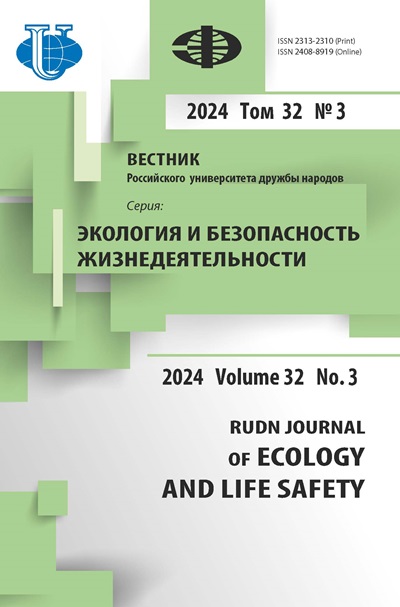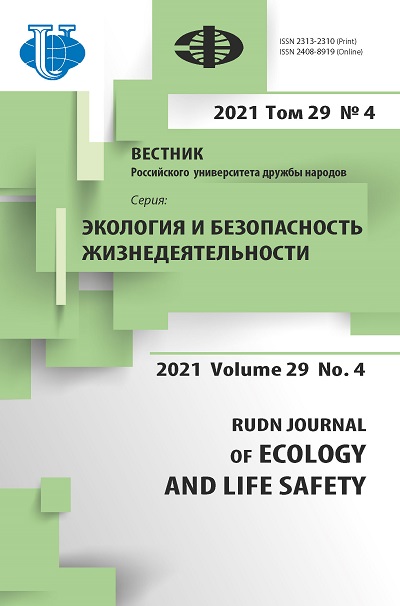Использование экономических методологий оценки при управлении водными ресурсами озера Виктория
- Авторы: Мамболео М.1
-
Учреждения:
- Российский университет дружбы народов
- Выпуск: Том 29, № 4 (2021)
- Страницы: 341-354
- Раздел: Экономика природопользования и экологический менеджмент
- URL: https://journals.rudn.ru/ecology/article/view/30864
- DOI: https://doi.org/10.22363/2313-2310-2021-29-4-341-354
Цитировать
Полный текст
Аннотация
Озеро Виктория - второе по величине пресноводное озеро в мире, экосистема которого критически важна для 25-30 млн жителей Кении, Уганды, Танзании, Руанды и Бурунди, проживающих в бассейне озера. Озеро обеспечивает несколько экосистемных услуг: от внутреннего водного транспорта, рыболовства до гидроэнергетики и поддерживает множество различных отраслей, таких как туризм, торговля и дикая природа. Однако управление экосистемой озера Виктория не было ресурсосберегающим; следовательно, его водные ресурсы используются либо неэффективно, либо чрезмерно. Это связано с тем, что ценность данного ресурса неизвестна или недооценена. Основная цель исследования - внести вклад в усилия по сохранению озера Виктория, предоставив лучшие методы, которые можно использовать для оценки ценности этого ресурса и разработки соответствующей политики для устойчивого управления озером. Проведен обзор соответствующей литературы по методам экономической оценки ресурсов окружающей среды в контексте управления водными ресурсами. В исследовании использовались поисковые системы Google Scholar, Web of Science и ScienceDirect. Предложены методы экономической оценки водной экосистемы озера Виктория для каждой услуги, которые могут применяться для оценки ценности и преимуществ сохранения и восстановления экосистемы озера.
Об авторах
Мартин Мамболео
Российский университет дружбы народов
Автор, ответственный за переписку.
Email: mamboleomartin@gmail.com
ORCID iD: 0000-0001-6685-5050
аспирант, департамент экологической безопасности и менеджмента качества продукции, Институт экологии
Российская Федерация, 117198, Москва, ул. Миклухо-Маклая, д. 6Список литературы
- Chave P. The EU water framework directive. IWA Publishing; 2001.
- Scheren PA, Zanting HA, Lemmens AM. Estimation of water pollution sources in Lake Victoria, East Africa: application and elaboration of the rapid assessment methodology. Journal of Environmental Management. 2000;58(4):235-248.
- Swallow BM, Sang JK, Nyabenge M, Bundotich DK, Duraiappah AK, Yatich TB. Tradeoffs, synergies and traps among ecosystem services in the Lake Victoria basin of East Africa. Environmental Science & Policy. 2009;12(4):504-519. http://doi.org/10.1016/j.envsci.2008.11.003
- Verschuren D, Johnson TC, Kling HJ, Edgington DN, Leavitt PR, Brown ET, Hecky RE. History and timing of human impact on Lake Victoria, East Africa. Proceedings of the Royal Society of London. Series B: Biological Sciences. 2002;269:289-294. http://doi.org/10.1098/rspb.2001.1850
- Dosi C. Environmental value, valuation methods, and natural disaster damage assessment. CEPAL; 2001.
- Barbier EB, Acreman M& Knowler D. Economic valuation of wetlands: a guide for policy makers and planners. Gland: Ramsar Convention Bureau; 1997. Available from https://www.iucn.org/backup_iucn/cmsdata.iucn.org/downloads/03e_economic_valuation_of_wetlands.pdf (accessed: 02.08.2021).
- Arrow K, Solow R, Portney PR, Leamer EE, Radner R, Schuman H. Report of the NOAA panel on contingent valuation. Federal Register. 1993;58:10.
- Sarukhán J, Whyte A. (eds.) Ecosystems and human well-being: wetlands and water. Washington: World Resources Institute; 2005.
- Herdendorf CE. Distribution of the world’s large lakes. In: Tilzer MM, Serruya C. (eds.) Large Lakes. Berlin, Heidelberg: Springer; 1990. p. 3-38.
- Crul R. Limnology and hydrology of Lake Victoria. UNESCO; 1995.
- Ntiba MJ, Kudoja WM, Mukasa CT. Management issues in the Lake Victoria watershed. Lakes & Reservoirs: Research & Management. 2001;6(3):211-216. http://doi.org/10.1046/j.1440-1770.2001.00149.x
- Stager JC, Johnson TC. The late Pleistocene desiccation of Lake Victoria and the origin of its endemic biota. Hydrobiologia. 2008;596(1):5-16. http://doi.org/10.1007/s10750-007-9158-2
- Geheb K, Medard M, Kyangwa M, Lwenya, C. The future of change: roles, dynamics and functions for fishing communities in the management of Lake Victoria’s fisheries. Aquatic Ecosystem Health & Management. 2007;10(4):467-480. http://doi.org/10.1080/14634980701704098
- Reynaud A, Lanzanova D. A global meta-analysis of ecosystem services values provided by lakes presented at the in Toulou. 2nd Annual Conference of the French Association of Environmental and Resource Economists. Toulouse; 2015.
- Brander LM, Florax RJ, Vermaat JE. The empirics of wetland valuation: a comprehensive summary and a meta-analysis of the literature. Environmental and Resource Economics. 2006;33(2):223-250. http://doi.org/10.1007/s10640-005-3104-4
- Fisher B, Turner RK. Ecosystem services: classification for valuation. Biological Conservation. 2008;141(5):1167-1169. http://doi.org/10.1016/j.biocon.2008.02.019
- Fisher B, Turner RK, Morling P. Defining and classifying ecosystem services for decision making. Ecological Economics. 2009;68(3):643-653. http://doi.org/10.1016/j.ecolecon.2008.09.014
- Lancaster KJ. A new approach to consumer theory. Journal of Political Economy. 1966; 74(2):132-157. Available from: https://www.journals.uchicago.edu/doi/pdf/10.1086/259131 (accessed: 20.08.2021).
- Clinch JP. Cost-benefit analysis applied to energy. In: Cleveland C. (ed.) Encyclopedia of Energy. Oxford, St. Louis: Elsevier; 2004. http://doi.org/10.1016/B0-12-176480-X/00237-0
- Loomis J, Bockstael N, McConnell K. Environmental and resource valuation with revealed preferences: a theoretical guide to empirical models. Environ. Resource Econ. 2009;42:133-135. https://doi.org/10.1007/s10640-008-9240-x
- National Research Council. Valuing ground water: economic concepts and approaches. National Academies Press; 1997.
- Hotelling H. The economics of exhaustible resources. Journal of Political Economy. 1931;39(2):137-175.
- Clawson MA, Knetsch JL. Economics of oufdoor recreation. Natural Resources Journal. 1966;8(13):738.
- Caulkins PP, Bishop RC, Bouwes NW. The travel cost model for lake recreation: a comparison of two methods for incorporating site quality and substitution effects. American Journal of Agricultural Economics. 1986;68(2):291-297.
- Bockstael NE, Hanemann WM, Kling CL. Estimating the value of water quality improvements in a recreational demand framework. Water Resources Research. 1987; 23(5):951-960. http://doi.org/10.1029/WR023i005p00951
- Rosen S. Hedonic prices and implicit markets: product differentiation in pure competition. Journal of Political Economy. 1974.82(1):34-55.
- Griliches Z. Price indexes and quality change: studies in new methods of measurement. Harvard University Press; 1971.
- Boyer T, Polasky S. Valuing urban wetlands: a review of non-market valuation studies. Wetlands. 2004;24(4):744-755. http://doi.org/10.1672/0277-5212(2004)024[0744:VUWARO]2.0.CO;2
- Markandya A, Harou P, Bellu LG, Cistulli V. Environmental economics for sustainable growth: a handbook for practitioners. Edward Elgar Publishing Ltd.; 2002.
- Byford S, Torgerson DJ, Raftery J. Cost of illness studies. BMJ. 2000;320(7245):1335. http://doi.org/10.1136/bmj.320.7245.1335
- Koopmanschap MA. Cost-of-illness studies. Pharmacoeconomics. 1998;14(2):143-148.
- Gertrude MN. Averting expenditure-measure of willingness to pay. Journal of Environment and Earth Science. 2014. p. 28-32.
- Lipton DW, Wellman K, Sheifer I, Weiher R. Economic valuation of natural resources: a handbook for coastal resource policymakers. NOAA Coastal Ocean Program Decision Analysis Series 5. Silver Spring, MD; 1995.
- Louviere JJ, Hensher DA, Swait JD. Stated choice methods: analysis and applications. Cambridge University Press; 2000. http://doi.org/10.1017/CBO9780511753831
- Carson RT. Contingent valuation: a practical alternative when prices aren’t available. Journal of Economic Perspectives. 2012;26(4):27-42. http://doi.org/10.1257/jep.26.4.27
- Ardila S, Quiroga R, Vaughan WJ. A review of the use of contingent valuation methods in project analysis at the Inter-American Development Bank. Washington, D.C.: Inter-American Development Bank, Sustainable Development Department, Environment Division; 1998.
- Champ PA, Flores NE, Brown TC, Chivers J. Contingent valuation, and incentives. Land Economics. 2002;78(4):591-604. Available from: http://le.uwpress.org/content/78/4/591.full.pdf+html (accessed: 25.08.2021).
- Bateman IJ, Carson RT, Day BH, Hanley N, Hett T, Swanson S. Guidelines for the use of stated preference techniques for the valuation of preferences for non-market goods. Cheltenham: Edward Elgar; 2003.
- Mitchell RC, Carson RT. Using surveys to value public goods: the contingent valuation method. RFF Press; 2013.
- Kahneman D, Knetsch JL. Valuing public goods: the purchase of moral satisfaction. Journal of Environmental Economics and Management. 1992;22(1):57-70. http://doi.org/10.1016/0095-0696(92)90019-S
- Hanley N, Wright RE, Adamowicz V. Using choice experiments to value the environment. Environmental and Resource Economics. 1998;11(3):413-428.
- Yapping D. The value of improved water quality: an application of contingent valuation and travel cost methods to East Lake in Wuhan, China. EEPSEA Research Reports. 1998.
- McConnell KE, Rosado MA. Valuing discrete improvements in drinking water quality through revealed preferences. Water Resources Research. 2000;36(6):1575-1582.
- Acharya G, Barbier E. Using domestic water analysis to value groundwater recharge in the Hadejia'Jama'are Floodplain, Northern Nigeria. American Journal of Agricultural Economics. 2002;84(2):415-426.
- Choe K, Whittington D, Lauria DT. The economic benefits of surface water quality improvements in developing countries: a case study of Davao, Philippines. Land Economics. 1996;72(4):519-537. http://doi.org/10.2307/3146913
- Phuong DM, Gopalakrishnan C. An application of the contingent valuation method to estimate the loss of value of water resources due to pesticide contamination: the case of the Mekong Delta, Vietnam. Water Resources Development. 2003;19(4):617-633.
- Adepoju AA, Omonona BT. Determinants of willingness to pay for improved water supply in Osogbo Metropolis, Osun State, Nigeria. Res. J. Soc. Sci. 2009;4:1-6.
- Travisi CM, Nijkamp P. Willingness to pay for agricultural environmental safety: evidence from a survey of Milan, Italy, residents. Working Paper no. 100-2004.
- Colombo S, Hanley N, Calatrava-Requena J. Designing policy for reducing the off-farm effects of soil erosion using choice experiments. Journal of Agricultural Economics. 2005;56(1):81-95.
- Abou-Ali H, Carlsson F. Evaluating the welfare effects of improved water quality using the choice experiment method. Working Papers in Economics. 2004;131.
















